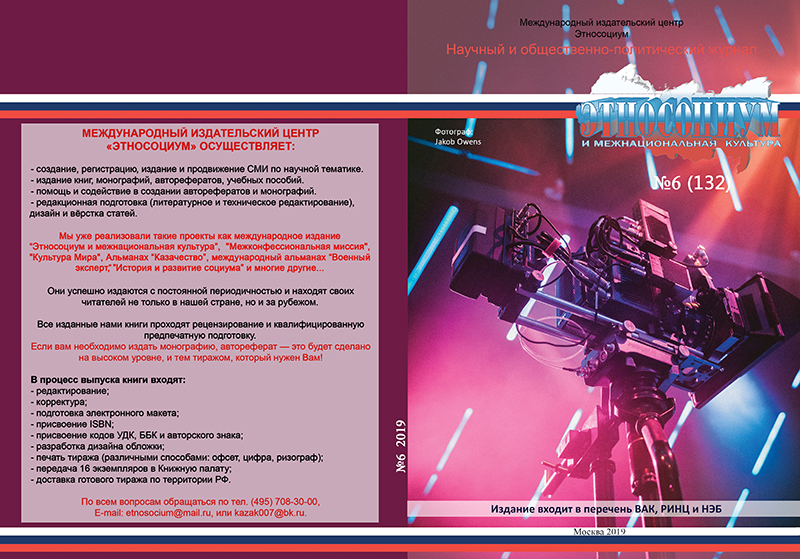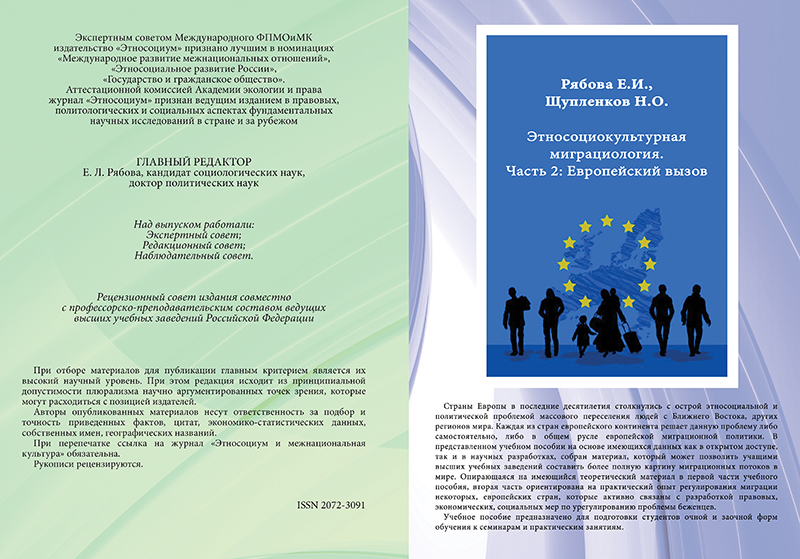

Content
|
COUNCIL OF INTERNATIONAL RELATIONSHIP
|
|
|
Zorin V.U. Ethnosocial and Cultural Migration in System Analysis
|
9
|
|
Napso M.D. On the social nature of ethnocentrism
|
15
|
|
Petrov I.F., Petrova S.I. Mass culture and multiculturalism and their influence on the dynamics of the cultural process
|
24
|
|
Komleva V.V., Zhizhych Andriyana The policy of replacement migration as a way to overcome the problems of socio-economic development of the region: the experience of Poland
|
31
|
|
ACTUAL PROBLEMS OF MODERN SOCIETY:
POLITICS, ECONOMICS, LAW
|
|
|
Ananchenkova P.I., Simonets N.L. Event tourism as a factor of ensuring the tourist attractiveness of the territories
|
48
|
|
Shchuplenkov O.V., Shchuplenkov N.O. Ethnosocial and cultural migration – modern approaches to the study of migration
|
60
|
|
Ternovaya L.O. "People's Avengers": historical memory and modernity
|
69
|
|
REGIONAL STUDY:
POLITICS, ECONOMICS, LAW
|
|
|
Lukyantsev A.S. Political and economic modernization of the Republic of Bashkortostan: to the question of the Strategy of socio-economic development of the Republic of Bashkortostan for the period up to 2030
|
80
|
|
INTERNATIONAL RELATIONSHIPS:
POLITICS, ECONOMICS, LAW
|
|
|
Mikhailenko A.N., Biryukov P.E. Strategyness of international transport corridors
|
89
|
|
Shamarov P.V. International Peacekeeping: Political and Legal Foundations
|
104
|
|
PRESS RELEASE
|
|
|
Belousov A.R. The problem of pressure security and supervisory authorities on business
|
115
|
|
"Oriental motifs in European art" exhibition
|
116
|
|
Abstracts
|
118
|
|
Authors
|
126
|
|
Requirements to materials submitted to the international publishing house "Etnosocium"
|
129
|
Object of consideration of the present article is the ethnocentrism phenomenon. The author analyzes the factors promoting forming of ideology and psychology of ethnocentrism, negative and positive characteristics of ethnocentrist installations and displays are researched. Dependence of ethnocentrism on conditions of social practice, specificity of a cultural-world outlook and psychological context, character of the pursued purposes is traced, consequences of ethnocentrism for development of a society and an ethnic generality are considered.
Keywords: out-groups, in-groups, we, they, ethnos, processes, representatives, research, sociology, ethnocentrism, ethnophobia, stereotype, favoritism, conflictness, cultural relativism.
The article is devoted to the analysis of cultural processes taking place in the world, manifested in the diffusion of culture, contributing to the dynamic processes of formation of a single world community. The possibility of mass movements of ethnic groups creates conditions for new combinations of cultures. This is a global process. It is shown that the process of expanding the geographical boundaries of post-national multiculturalism coincides with the modernization and strengthening of the promotion of mass culture in the cultural and historical space. And although today there is a formation of "world civilization" with an obvious predominance of mass culture, nevertheless, it is premature to talk about "world culture" as a whole unified concept. The intensive national dialogue of cultures and interaction continues.
Keywords: culture, cultural processes, dynamics, dynamics of culture, multiculturalism, mass culture, society, civilization.
Replacing migration is considered by the authors as one of the ways to solve the socio-economic problems of countries with an aging population and a shortage of labor resources. The authors point out the weak effectiveness of the replacement migration policy of Poland compared to Western European countries and highlight such reasons as the lower attractiveness of lifestyle in Poland, the orientation of Poland to certain target groups of migrants and “geographical preferences”, high competition of countries for skilled labor from among migrants.
Keywords: substitute migration, international migration, migration policy, migration processes, Poland.
According to experts, event tourism has a positive impact on the development of the territory, not even possessing unique tourist resources. According to the researchers, event tourism acts as an effective tool for development in the context of the economic crisis. Also, successful events have a positive impact on the image of the territory beyond its borders. In the Russian Federation, event tourism is a new direction of the tourism sector, characterized by rapid development in recent years.
Keywords: image, territory, event tourism, promotion, attractiveness.
The article discusses the issues of interdisciplinary communication when considering the migration process through the prism of the ethnic, social and cultural theory. The system approach allows us to objectively consider the issues of migration flows, their internal and external dependence. The necessity of the further development of migration as an independent scientific discipline is emphasized.
Keywords: conflict, culture, ethnos, migration, migration policy.
Both the Patriotic War of 1812 and the Great Patriotic War in our country were replete with the exploits of the partisans. In many armed conflicts, partisans made a decisive contribution to victory. For two centuries, the guerrilla movement has become so widespread, which has gone far beyond the borders of periods of wars and armed conflicts, and resistance to objectionable authorities. Guerrilla behavior has become part of social psychology, which made it possible to use guerrilla technology in marketing.
Keywords: war, guerrilla movement, resistance, collaborationism, marketing.
This article discusses the Strategy for the socio-economic development of the Republic of Bashkortostan until 2030 for the purpose of following the power institutions and institutions to the principles of political and economic modernization. The author analyzes the targets of the modernization doctrine of the region, relates them to the theoretical views of modern researchers and forms an opinion on the prospects for socio-economic and socio-political transformations.
Keywords: modernization, strategic planning, political system, socio-economic development, region.
Modern global political processes acquire new features that create new challenges for Russia's geopolitical competitiveness. In large international economic projects, including international transport corridors (ITC), the property of strategyness comes into foreground. The effective development of transport corridors is estimated not only by the amount of dollars, tons and kilometers, but also insofar ITC contribute to strengthening the geopolitical and geo-economic status of the country. In the article the concept of strategyness is analyzed and its main criteria are formulated. The main directions of ensuring the strategyness of large international economic projects are proposed.
Keyword: ITC, international transport corridors, theory of solving foreign policy problems, strategyness, harmonicity, geopolitical competitiveness, measurability, leadership.
The article examines the key documents of the United Nations in the field of peacemaking and proposes their universal classification, which subdivides the entire UN official document management two categories - documents of its main and subsidiary bodies.
It has been substantiated that the documents of the main bodies form the basis of the current political and legal framework of UN peacekeeping, while the documents of the subsidiary bodies, while not being such normative acts, have a substantial indirect effect on practical peacekeeping.
The significant administrative autonomy and direct influence on the practical peacekeeping mechanisms of the Secretary-General and the UN Secretariat, whose management activities may conflict with the position of the permanent members of the Security Council and implement peacekeeping operations with their own political attitudes, are argued.
Keywords: UN, Security Council, General Assembly, Secretary General, Secretariat, international, peacekeeping, peacekeeping operation, peacekeeping mission.